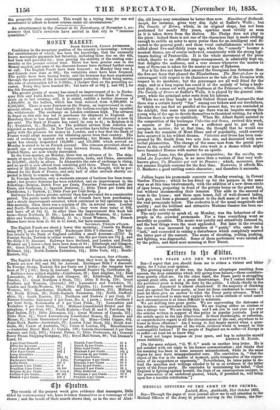reins War.
THE PEACE AND THE WAR DISPUTANTS.
Snt—I regret that you should deem me to evince a violent and bitter- for I value your opinion. The growing misery of the war, the dubious advantages resulting from success, the deep calamities which will spring from failure,—these considera- tions greatly affect me. On the other hand, the Peace party is struggling against great odds, and at a great disadvantage. For I cannot think that the periodical press is doing its duty by the public. I allude chiefly to the daily press. Argument is almost abandoned. If the majority of thinking men are against the Peace party, at least let them condescend to reason : at least let them give an answer to what the Peace party advance. What I have now ventured to state may explain why a calm attitude of mind under such circumstances is at times difficult to maintain.
We are drifting into great perils. We are aggravating the distresses of the helpless, unrepresented millions. We are waging either an aimless or else a savage war. We are doing this, and I ask you to cast your eye over the articles written in support of this policy in popular journals. Look at the article again in the last Blackwood. Is there forethought, or reflection, or comprehensive regard to all the circumstances of the case, anywhere to be found in these effusions ? Am I wrong to feel deeply moved when a ques- tion affecting the happiness of the whole civilized world is treated in this- contemptible fashion / If the people of England are to suffer—if Europe is- to suffer—at least let us know why.
I must not longer trespass on your space, and beg to subscribe myself
[On the same subject, "G. W. C." sends us another long letter. He is not satisfied with our reply to his former communication ; and thinks that his meaning has been in some measure misunderstood, while in the same degree be may have misapprehended ours. His conviction is, "that the object of the war ls the matter of moment, quite irrespective of the expres- sions of its supporters or opponents." Nevertheless, he takes pains to de- fend the speeches 4nd writings alluded to by us as evidence of the bitter spirit of the Peace party. He concludes by maintaining his belief, "that England is fighting against herself, the dupe of an unscrupulous usurper, in the prosecution of an undefined quarrel, which, if persisted in, will brill& upon her a terrible retribution."]


























 Previous page
Previous page